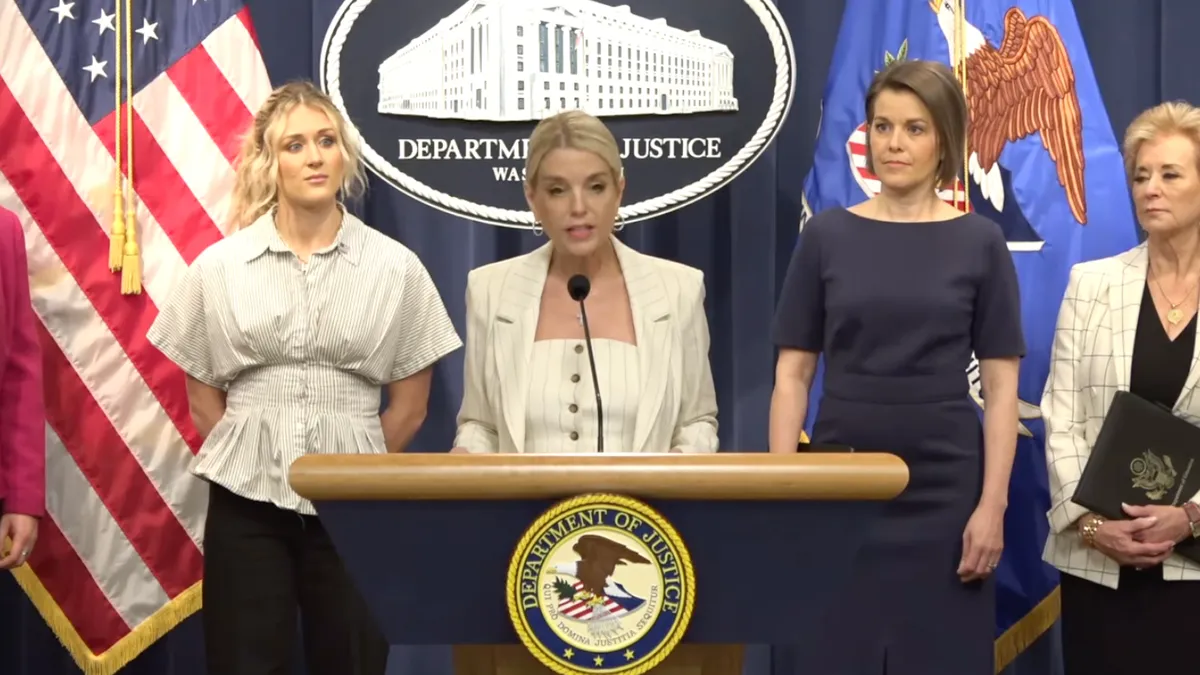The Biden administration on Dec. 20 withdrew a proposed rule that would have extended Title IX protections to transgender student athletes, acknowledging that public sentiment and legal challenges made finalizing the rule too difficult.
The U.S. Department of Education "recognizes that there are multiple pending lawsuits related to the application of Title IX in the context of gender identity, including lawsuits related to Title IX’s application to athletic eligibility criteria in a variety of factual contexts," said the Federal Register notice announcing the end to this rulemaking. The rule had been intended as an update to regulations under the 1972 Title IX statute barring sex discrimination in federally funded education programs.
The withdrawal comes as President Joe Biden prepares to leave office next month and President-elect Donald Trump gets ready to begin his second term in office. Title IX regulations have ping-ponged back and forth between Democratic and Republican administrations since President Barack Obama's administration.
Trump and some conservative lawmakers have criticized the proposed rule, which would have prohibited blanket bans on transgender students’ participation on sports teams aligning with their gender identities, as unfair to women athletes.
The Biden administration had originally intended to finalize the rule later in 2023, but repeatedly delayed that in the face of political and public controversy — and the impending 2024 presidential election.
The department's withdrawal notice, which was filed Dec. 20 and is expected to be published Dec. 26, noted that the agency received more than 150,000 widely varying comments during a 30-day comment period after the proposed rule's April 2023 release.
Some commenters recommended the rule include more students, particularly in K-12, who could participate on a sex-separate athletic team consistent with their gender identities. But others called the proposed rule too complex and predicted it would face implementation challenges.
A "significant number" of commenters also cited case law, scientific studies and research that supported adopting, modifying or withdrawing the proposed rule, according to the notice.
From the outset, the proposed rule led to a hotbed of controversy in the political arena.
In a statement Friday, Rep. Virginia Foxx, R-N.C., welcomed the proposal's demise. “The Biden-Harris administration’s proposed rule to hurt women’s sports is antithetical to the cornerstone of sports — fairness,” said Foxx, the outgoing chair of the House Education and the Workforce Committee. “Allowing men to compete against women undermines and limits opportunities for women. It’s also antithetical to the cornerstone of Title IX, which was intended to give women more opportunities, not take them away.”
Foxx's statement noted that the Republican-majority House passed the Protection of Women and Girls in Sports Act in April 2023, which states that in the athletic context, sex is recognized as "based only on a person’s reproductive biology and genetics at birth."
States have also set policies on including transgender athletes on sports teams. Some 25 states prohibit transgender students from participating in sports aligned with their gender identity, according to the Movement Advancement Project, which tracks the issue.
Research in 2022 from The Trevor Project, a nonprofit that provides crisis support for LGBTQ+ youth, found that transgender and nonbinary youth who have gender-affirming spaces and gender identity acceptance from adults and peers reported lower rates of attempting suicide in the prior year.
The Title IX athletics proposed rule is separate from a broader Title IX final rule that extends sexual discrimination protections to include LGBTQI+ students and staff. That rule, which was implemented in August, faces several legal challenges and is temporarily blocked in at least 26 states.
Many educators and policy watchers are anticipating that the incoming Trump administration will rescind that rule and reinstate a 2020 Title IX regulation implemented by the first Trump administration. The 2020 rule has a narrower definition of sex-based harassment and differs also in reporting, complaint investigation and resolution practices.





















